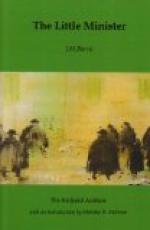“Could you?” asked Nanny, eagerly, unloosening her bonnet-strings. “Mercy on me!” she had to add; “to think about altering bonnets on the Sabbath-day! Lassie, how could you propose sic a thing?”
“Forgive me, Nanny,” Babbie replied, so meekly that the old woman looked at her curiously.
“I dinna understand what has come ower you,” she said. “There’s an unca difference in you since last nicht. I used to think you were mair like a bird than a lassie, but you’ve lost a’ your daft capers o’ singing and lauching, and I take ill wi’t. Twa or three times I’ve catched you greeting. Babbie, what has come ower you?”
“Nothing, Nanny. I think I hear the bell.”
Down in Thrums two kirk-officers had let their bells loose, waking echoes in Windyghoul as one dog in country parts sets all the others barking, but Nanny did not hurry off to church. Such a surprising notion had filled her head suddenly that she even forgot to hold her dress off the floor.
“Babbie,” she cried, in consternation, “dinna tell me you’ve gotten ower fond o’ Mr. Dishart.”
“The like of me, Nanny!” the gypsy answered, with affected raillery, but there was a tear in her eye.
“It would be a wild, presumptious thing,” Nanny said, “and him a grand minister, but—”
Babbie tried to look her in the face, but failed, and then all at once there came back to Nanny the days when she and her lover wandered the hill together.
“Ah, my dawtie,” she cried, so tenderly, “what does it matter wha he is when you canna help it!”
Two frail arms went round the Egyptian, and Babbie rested her head on the old woman’s breast. But do you think it could have happened had not Nanny loved a weaver two-score years before?
And now Nanny has set off for church and Babbie is alone in the mud house. Some will pity her not at all, this girl who was a dozen women in the hour, and all made of impulses that would scarce stand still to be photographed. To attempt to picture her at any time until now would have been like chasing a spirit that changes to something else as your arms clasp it; yet she has always seemed a pathetic little figure to me. If I understand Babbie at all, it is, I think, because I loved Margaret, the only woman I have ever known well, and one whose nature was not, like the Egyptian’s, complex, but most simple, as if God had told her only to be good. Throughout my life since she came into it she has been to me a glass in which many things are revealed that I could not have learned save through her, and something of all womankind, even of bewildering Babbie, I seem to know because I knew Margaret.




